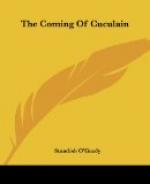CHAPTER XII
THE SACRED CHARIOT
“He dwelt a while among
the neat-herds
Of King Admetus, veiling his godhood.”
Greek Mythology.
“At Tailteen I raced my steeds against a woman,
Though great with child she came first to the goal,
Alas, I knew not the auburn-haired Macha,
Thence came affliction upon the Ultonians.”
Concobar mac Nessa.
Concobar Mac Nessa on a solemn day called Cuculain forth from the ranks of the boys where they stood in the rear of the assembly and said—
“O Setanta, there is a duty which falls to me by virtue of my kingly office, and therein I need an assistant. For it is my province to keep bright and in good running order the chariot of Macha wherein she used to go forth to war from Emain, and to clean out the corn-troughs of her two steeds and put there fresh barley perpetually, and fresh hay in their mangers. Illan the Fair [Footnote: He was one of the sons of Fergus Mac Roy slain in the great civil war.] was my last helper in this office, till the recent great rebellion. That ministry is thine now, if it is pleasing to thee to accept it.”
The boy said that it was pleasing, and the King gave him the key of the chamber in which were the vessels and implements used in discharging that sacred function.
Afterwards, on the same day, the King said to him, “Wash thyself now in pure water and put on new clean raiment and come again to me.”
The boy washed himself and put on new clean raiment. The King himself did the same.
Concobar said: “Go now to the chamber of which I have given thee the key and fill with oil the silver oil-can and take a towel of the towels of fawn-skin which are there and return.” He did so; and Concobar and his nephew, armed youths following, went to the house of the chariot.
Ere Concobar turned the wards of the lock he heard voices within in the chariot-house. There, one said to another, “This is he. Our long watch and ward are near the end.” And the other said, “It is well. Too long have we been here waiting.”
“Hast thou heard anything, my nephew?” said Concobar.
“I have heard nothing,” said the lad.
Concobar opened the great folding-doors. There was a sound there like glad voices mingled with a roar of revolving wheels, and then silence. Setanta drew back in dismay, and even Concobar stood still. “I have not observed such portents before in the chariot-house,” he said. The King and his nephew entered the hollow chamber. The chariot was motionless but very bright. One would have said that the bronze burned. It was of great size and beauty. By its side were two horse-stalls with racks and mangers, the bars of the rack were of gold bronze which was called findruiney, and the mangers of yellow brass. The floor was paved with cut marble, the walls lined with smooth boards of ash. There were no windows, but there were nine lamps in the room. “It will be thy duty to feed those lamps,” said Concobar.




